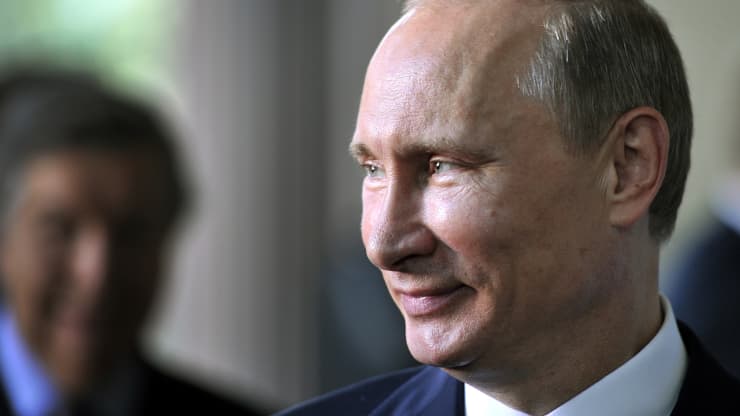CNBC
Russian President Vladimir Putin has sought to ratchet up the pressure on foreign buyers of natural gas, telling so-called unfriendly countries to pay in rubles from Friday — or have their supplies cut off.

Perhaps surprisingly, however, the leaders of Germany and Italy appear unfazed by Putin’s rhetoric.
That’s because they believe European customers won’t be bound by the Kremlin’s new mechanism and can instead continue paying for Russian gas in euros or dollars.
Putin on Thursday issued a decree insisting foreign buyers of Russian gas must pay in rubles from Friday by opening a Russian bank account or have their contracts for deliveries canceled.
Russia’s president has repeatedly demanded that so-called unfriendly countries make the currency switch for Russian gas, targeting those behind the heavy economic sanctions designed to isolate Russia over its unprovoked onslaught in Ukraine.
“Today I signed a decree that establishes the rules for trading Russian natural gas with the so-called ‘unfriendly’ states. We offer counter parties from such countries a clear and transparent scheme, in order to purchase Russian natural gas, they must open ruble accounts in Russian banks,” Putin said in a televised address, according to a translation.
“If these payments are not made, we will consider it a failure of the buyer to fulfill its obligations with all the ensuing consequences.”
Putin said existing contracts would be stopped if these terms were not met from Friday.
Germany, Europe’s biggest consumer of Russian gas, said Putin’s decree amounted to “political blackmail,” while the U.S. said the measure shows financial “desperation” on the part of the Kremlin.
Instead of stoking panic in Berlin and Rome, German Chancellor Olaf Scholz and Italian Prime Minister Mario Draghi believe the decree does not apply to them.
Russia’s state-controlled gas giant Gazprom said Friday it was continuing to supply natural gas to Europe via Ukraine in line with requests from customers, according to Reuters. CNBC has contacted a spokesperson at Gazprom for further details.
A process of reflection within Russia’
A German government readout of a call between Scholz and Putin on Wednesday said the Russian president had informed Scholz that gas deliveries would have to be settled in rubles from April 1.
“At the same time, [Putin] emphasized in the conversation that nothing would change for the European contractual partners,” the readout said.
Payments would continue to be made exclusively in rubles as usual to Russia’s Gazprombank, which is not affected by economic sanctions, and the bank would then convert the money into euros, the statement said.
Scholz did not agree to this procedure, and has since reiterated his stance that Germany would continue to pay for Russian gas in either euros or dollars under existing contracts.
“We have looked at the contracts on gas and other deliveries and … it is stated that the payment is in euros. Sometimes in dollars but usually in euros. And I told the Russian president that it will stay that way,” Scholz said to reporters in Berlin on Thursday, according to a translation.
The Kremlin’s readout of the same call said the currency switch was necessary due to the fact that the foreign exchange reserves of the Central Bank of Russia had been frozen by EU member states. It was agreed that experts from Russia and Germany would continue to negotiate on this matter, the Russian statement said.
Meanwhile, Italy’s Draghi also held a call with Putin on Wednesday. And, speaking to reporters on Thursday about the outcome of those talks, Draghi said Italy does not expect a halt to the deliveries of Russian gas.
Existing contracts would instead remain in force and European firms would continue to pay in euros or dollars rather than rubles, Draghi said, according to Reuters. The Italian prime minister also indicated that he believed Putin had softened previous demands for gas payments in rubles.
“I think there has been a process of reflection within Russia that has led to a better definition of what it means to pay in rubles, as President Putin defined it yesterday,” Draghi said Thursday, Reuters reported.
“What I understood, but I may be wrong, is that the conversion of the payment … is an internal matter of the Russian Federation,” he added.
Kremlin spokesman Dmitry Peskov confirmed earlier in the week that Russia would not be seeking gas payments in rubles immediately, saying instead the switch was likely to be a “gradual process.”
Putin “demanded rouble payment for gas … quickly recognized he’s not in a position to make demands … and backed off,” Ian Bremmer, founder and president of Eurasia Group, a political risk consultancy, said via Twitter.
“Suspect we are going to see a lot of that going forward,” he added.
Europe’s dependence on Russian gas
Germany, alongside the G-7, has signaled that gas supply agreements cannot be unilaterally modified, and European buyers of Russian gas say the Kremlin is not entitled to redraw long-term contracts.
Energy analysts believe it is unlikely Gazprom will violate its existing contracts by refusing to supply gas to customers who won’t pay in rubles in the short term.
European countries’ dependence on Russian energy exports has been thrust into the spotlight since the Kremlin launched its invasion of Ukraine on Feb. 24, particularly as energy-importing countries continue to top up Putin’s war chest with oil and gas revenue on a daily basis.
Analysis from campaign group Transport & Environment shows Russia’s military might is being reinforced by $285 million in oil payments made every day by European countries.
Indeed, revenue from Russian oil and gas was seen to be responsible for roughly 43% of the Kremlin’s federal budget between 2011 and 2020, highlighting how fossil fuels play a central role for the Russian government.
The European Union receives roughly 40% of its gas via Russian pipelines, several of which run through Ukraine.



